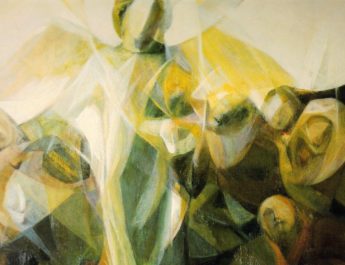BibleHub
14 Indeed, the bodyA does not consist ofB oneC memberD but of many.E
Notes on verse 14
A “body” = soma. Perhaps from sozo (to save, heal, rescue); from sos (safe, well, rescued). This is body or flesh. It can be body in a literal or figurative sense (as the body of Christ). This is where the word “somatic” comes from.
B “does…consist of” = eimi. This is to be, exist.
C “one” = heis. This is one, a person, only, some.
D “member” = melos. This is a limb or an organ of the body. So, it is a member of a greater whole. It is used figuratively for the body of Christ.
E “many” = polus. This is much, often, plenteous – a large number or a great extent.
15 If the footF would say, “Because I amG not a hand,H I do not belongI to the body,” that would not makeJ it any less a part of the body.
Notes on verse 15
F “foot” = pous. This is foot, literal or figurative.
G “am” = eimi. Same as “does…consist of” in v14. See note B above.
H “hand” = cheir. This is the hand in a literal sense. Figuratively, the hand is the means a person uses to accomplish things so it can also mean power, means, or instrument.
I “belong” = eimi. Same as “does…consist of” in v14. See note B above.
J “make” = eimi. Same as “does…consist of” in v14. See note B above.
16 And if the earK would say, “Because I am not an eye,L I do not belong to the body,” that would not make it any less a part of the body. 17 If the wholeM body were an eye, where would the hearingN be? If the whole body were hearing, where would the sense of smellO be?
Notes on verses 16-17
K “ear” = ous. This is the physical ear, or the perception of hearing, whether physical or cognitive.
L “eye” = ophthalmos. From optanomai (to appear, be seen by); from horao (become, seem, appear). This is eye or sight. It is used figuratively for the mind’s eye, a vision, or for envy.
M “whole” = holos. This is whole, complete, or entire. It is a state where every member is present and functioning in concert. This is the root of the word “whole.”
N “hearing” = akoe. From akouo (listen, hear, understand through hearing). This is hearing, ear, audience, fame, report, rumor.
O “sense of smell” = osphresis. 1x in NT. From osphrainomai (to smell) OR related to ozo (to make a scent, generally a bad smell). This is smelling or the sense of smell.
18 But as it is, GodP arrangedQ the members in the body, eachR one of them, as he chose.S
Notes on verse 18
P “God” = Theos. From Proto-Indo-European origins, meaning do, put, place. This is God or a god in general.
Q “arranged” = tithemi. This is to put, place, set, fix, establish in a literal or figurative sense. Properly, it is placing something in a passive or horizontal position.
R “each” = hekastos. Perhaps from hekas (separate). This is each one, any, every. It is every individual as a distinct entity as opposed to those counted as a group in small sets.
S “chose” = thelo. This is to wish, desire, will, or intend. It is to choose or prefer in a literal or figurative sense. It can also mean inclined toward or take delight in. It can have a sense of being ready to act on the impulse in question.
19 If allT were a singleU member, where would the body be? 20 As it is, there are manyV members yet one body.
Notes on verses 19-20
T “all” = pas. This is all, every.
U “single” = heis. Same as “one” in v14. See note C above.
V {untranslated} = men. This is truly, indeed, even, in fact. Often, it is not translated, but used to emphasize affirmation
21 The eye cannotW say to the hand, “I haveX no needY of you,”
nor again the headZ to the feet, “I have no need of you.”
Notes on verse 21
W “cannot” = ou + dunamai. Dunamai is to be able, or something that is possible. It can also be empowered or being powerful. The Greek word for “miracle” (dunamis) comes from this root.
X “have” = echo. This is to have, hold, possess.
Y “need” = chreia. From chraomai (to use, make use of, give what is needed, act in a specific way, request); related to chre (what is proper, fitting, or necessary). This is the is task, business, or affair. It can also be need, want, or destitution.
Z “head” = kephale. This is head or chief. It can be a literal head or, figuratively, a ruler or lord. It can also refer to a corner stone. This is where the word “cephalic” comes from.
22 On the contrary,AA the members of the body that seemBB to beCC weakerDD are indispensable,EE
Notes on verse 22
AA “on the contrary” = alla + polus + mallon. Polus is the same as “many” in v14. See note E above. Mallon is rather, more than, or better.
BB “seem” = dokeo. From dokos (opinion). This is to have an opinion, seem, appear, think, suppose. It deals with a personal judgment. This is the root of the word “doxology.”
CC “be” = huparcho. From hupo (by, under, about, subordinate to) + archo (to rule, begin, have first rank or have political power). This is to begin or be ready, to exist or possess. It is what one already has or possesses.
DD “weaker” = asthenes. From a (not) + sthenes (strong, vigor); {from the base of sthenoo (to strengthen so that one can be mobile); from sthenos (strength)}. This is without strength so weak, sick, helpless, frail, feeble. It can also be unimpressive or impotent. It can be used for physical or moral weakness.
EE “indispensable” = anagkaios. 8x in NT. From anagke (necessity – something that happens that requires an immediate response; associated with pain or distress); {from ana (up, again, back, among, anew) + agcho (to press tightly or compress)} OR ana (see above) + agkale (the arm, particularly one that is bent to carry a load); {from agkos (a bend)}. This is necessary, essential, proper, intimate. It can be used to refer to close relatives.
23 and those members of the body that we thinkFF less honorableGG we clotheHH
Notes on verse 23a
FF “think” = dokeo. Same as “seem” in v22. See note BB above.
GG “less honorable” = atimos. 4x in NT. From a (not, without) + time (worth or something’s perceived value; literally, price, but figuratively, the honor or value one sees in someone or something else; also esteem or dignity; also precious or valuables); {from tino (to pay, be punished, pay a penalty or fine because of a crime); from tio (to pay respect, value)}. This is without honor, despised, not valued, not recognized.
HH “clothe” = peritithemi. Related to “arranged” in v18. 8x in NT. From peri (about, concerning, all around, encompassing) + tithemi (see note Q above). This is to place around i.e. to clothe. Figuratively, it can mean to bestow or to present.
with greaterII honor,JJ and our less respectableKK members are treatedLL with greater respect,MM
Notes on verse 23b
II “greater” = perissos. From peri (all-around, encompassing, excess). This is abundant, more, excessive, advantage, vehemently.
JJ “honor” = time. Related to “less honorable” in v23. See note GG above.
KK “less respectable” = aschemon. Related to “have” in v21. 1x in NT. From a (not, without) + schema (figure, appearance, form – outer shape; figuratively, can be external condition); {from echo (see note X above)}. This is literally shapeless. Figuratively, it means unattractive, indecent, unpresentable, or inelegant.
LL “treated” = echo. Same as “have” in v21. See note X above.
MM “respect” = euschemosune. Related to “have” in v21 & “less respectable” in v23. 1x in NT. From euschemon (presentable, seemly, prominent, noble, appropriate, desirable, well-formed); {from eu (good, well, well done) + schema (see note KK above)}. This is respect, being presentable or becoming.
24 whereas our more respectableNN members do notOO need this. But God has so arrangedPP the body, givingQQ the greater honor to the inferiorRR member,
Notes on verse 24
NN “more respectable” = euschemon. Related to “have” in v21 & “less respectable” and “respect” in v23. 5x in NT. See note MM above.
OO {untranslated} = echo. Same as “have” in v21. See note X above.
PP “arranged” = sugkerannumi. 2x in NT. From sun (with, together with) + kerannumi (to mix, mingle); {from kerao (to mix)}. This is to mix together, arrange, unite so that different elements work in concert, assimilate.
QQ “giving” = didomi. To give, offer, place, bestow, deliver. This is give in a literal or figurative sense.
RR “inferior” = hustereo. 16x in NT– same verb used by the rich young man when he asks Jesus what do I still lack? (Mt 19:20); used in the parable of the prodigal son to describe him as impoverished (Lk 15:14); used when the wine ran out at the wedding at Cana (Jn 2:3); all have sinned and fall short of the glory of God (Rom 3:23); used in describing the body of Christ – that we give greater honor to the inferior member (1 Cor 12:24). From husteros (last, later). This is to fall behind, come late, be interior, suffer need, be left out., to fail to meet a goal.
25 that there may be no dissensionSS within the body, but the members may have the same careTT for one another. 26 If one member suffers,UU
Notes on verses 25-26a
SS “dissension” = schisma. 8x in NT. From schizo (to split, divide, tear, sever; split in a literal or figurative sense). This is a split or a tear. Figuratively, it can refer to a schism, division, or dissension. This is where the word “schism” comes from and also “schizophrenia” (literally “split mind”).
TT “care” = merimnao. 19x in NT. From merimna (care, worry, anxiety; being separated from the whole); from merizo (to divide, part, share, distribute, assign; figuratively, to differ); from meros (part, share, portion figurative or literal); from meiromai (to get your share, receive one’s allotment). This is to be anxious, distracted, or care for. It is being pulled in different directions – usually a negative.
UU “suffers” = pascho. Akin to penthos (mourning, sorrow). This is to be acted on for good or ill. It is often used for negative treatment. Properly, it means feeling strong emotions – especially suffering. It can also be the ability to feel suffering.
all suffer together withVV it; if one member is honored,WW all rejoiceXX together with it.
Notes on verse 26b
VV “suffer together with” = sumpascho. Related to “suffers” in v26. 2x in NT. From sun (with, together) + pascho (see note UU above). This is to suffer together or sympathize. It is sharing pain. It can refer to persecution in particular.
WW “is honored” = doxazo. Related to “seem” in v22. From doxa (glory, opinion, praise, honor, renown; particularly used as a quality of God or manifestation of God – splendor); from dokeo (see note BB above). This is to render or hold something as glorious, to glorify, honor, magnify, or celebrate. This is ascribing weight to something by recognizing its true value or essence.
XX “rejoice” = sugchairo. 7x in NT. From sun (with, together with) + chairo (to rejoice, be glad; used to say hello; properly, delighting in the grace of God or experiencing God’s favor); from char– (to extend favor, lean towards, be inclined to be favorable towards). This is to share joy or rejoice together.
Image credit: “Abstract Body” by Valerie Everett, 2008.




